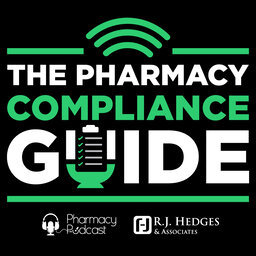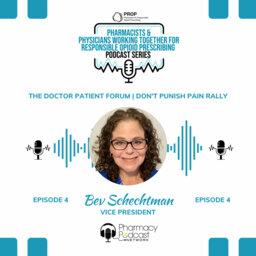Participating or Non-Participating, That is the Question - Pharmacy Podcast Episode 465
Pharmacy Compliance Guide
Podcast Session 7
Participating or Non-Participating, That is the Question
Participating vs non-participating, what does this mean?
- Participating means that you are accepting the Medicare reimbursement or allowable for each product you bill for.
- Non-Participating means that you are not accepting the Medicare reimbursement.
So participating means accepting Assignment?
- Yes, you are accepting the Medicare allowable or Assignment. You also agree to charge the patient no more than 20% of the allowable at the time of dispensing. Medicare sends the supplier the reimbursement of 80%, less the 2% sequestration fee. If you know the patient has a secondary insurance carrier, the copay should only be the balance after the secondary payment. This can be collected at the time of dispensing which is preferred or after all payments are received.
I guess this means if I’m non-participating, I’m not accepting Assignment
- Correct, you are not accepting the Medicare assignment.
Is the pharmacy penalize in any way?
- No, there is no penalty to the supplier, except if the supplier is a competitive bid awardee supplier who must be a participating supplier. The major difference is the supplies is not accepting assignment. Which means the Medicare reimbursement will be sent to the patient. The supplier collects the full amount from the patient at the time of dispensing. This fee can be your Usual & Customary (U&C) down to the Medicare allowable. It is the supplier’s choice for each dispensing action.
- Yes, you can accept assignment on a specific item or a specific patient if you so choose
OK, we now understand this, there must be a reason why you want to talk about this subject now. It doesn’t sound very important or fun?
Well it is definitely not fun!
However it is very important. Medicare reimbursement are continuing to be slashed and every supplier should look at this option every year, but especially this year. There is only a short time period where a supplier can change their status from Participating to Non-Participating and it’s coming in November. The official time frame is from November 15 to December 31, but we strongly encourage not to go past December 15th. NSC states the letter must be post marked by December 31st, but if there is a glitch, the supplier has to wait a year. It doesn’t matter whose fault it is, you must wait until next November 15th.
The requirement states, “if you are currently a participant, write to each carrier to which you submit claims, advising of your termination effective the first day of the next calendar year. This written notice must be postmarked prior to the end of the current calendar year.”
In plain English, the supplier writes a letter on their letterhead to the National Supplier Clearinghouse for CMS 855S products or to the Part B Contractor for CMS 855B products advising the contractor you are terminating you participating status. The letter must contain your Legal Business Names as reported to the IRS, Address on your CMS 855, PTAN, NPI and the “Authorized Persons” signature. CMS doesn’t tell you that.
We are writing a blog on this subject and it will be posted on our public website, www.RJHedges.com and we will have a sample letter there for you to download. Our clients will find the sample letter on the Compliance Portal® in the Message Center.
OK, we know what this means and how do to it, but what are the reasons to make the choice?
Simple. Profit margin. At some point every pharmacist and healthcare provider must stop being a healthcare provider and start being a business owner. There is a big difference and this might sound harsh, but it’s true. If you take care of the patient at all costs, you will be out of business and you and your staff will be out of a job. You must keep a keen eye on your profit margin. Everyone knows a lot of pharmacy owners who have gone out of business. They were great pharmacists, took care of the patients, but maybe not the best business people.
You must look at your competition, your patients, and your staff and make an informed decision whether moving to a non-participation status will work for you. The first thing you need to do if you move to non-participating and not accepting assignment, is educate your patients. Let them know that starting January 1st, you will be collecting the full fee of Medicare Part B products and Medicare and their secondary will send them their reimbursement checks. They also must understand about the sequestration 2% and copays and the difference between the Medicare allowable and your Usual and Customary fee.
I have had clients who have transition to non-assignment with no problems and other who have had a disaster. It’s all about education
I’m still concerned about repercussions from the patients. How do I answer questions like?
- Why are you making me pay now and wait for Medicare pay me?
- Changes in Medicare are happening to you as well as me. It is getting harder for us to stay in business so we can take care of you and everyone else in the community. This is one way we are trying to see if it will work. We are not happy either but we have to make adjustments so we can be here to take care of you.
- You are supposed to be helping me, how does this help me, I don’t have all the money right now?
- OK, let’s sit down together and see if we can work out a plan together that works for you. You just personalized the conversation
Answers need to be straight forward to the patient. These are tough questions and depending on your individual market, you may say I don’t want to do this and that is OK. Every business must look at their options every year and this is one of them. There are no simple answers. For example:
- If the patient is dual eligible the individual state Medicaid program may have very specific restrictions that prohibit this. In this case you can accept assignment for the individual product for the individual patient at the time of billing.
- Your competitor may have all dropped DMEPOS products and when your patients ask why, you can explain the cut in reimbursements and the wait in payments.
Jeff, so wrapping up, on our conversation today,
At the end of the day, it comes down to a business decision that each pharmacist owner needs to make. And we are strongly recommending that every pharmacy owner look at this option this year. We are not telling you to do it, but to review your books, your patients and your competition. Be prepared to act or not act on November 15th. If you decide to move to non-participation you now know you can still accept assignment on certain products at any time.
 Pharmacy Podcast Network
Pharmacy Podcast Network



